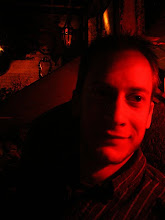As a fresh writer, I’m keenly interested in the process which established writers used to become so. I read Joanne Rowling's Wikipedia entry with grotesque abandon several weeks back, utterly absorbed by the fact that Harry Potter was her first published book. Isn’t that what all new authors yearn to hear? That maybe, just maybe, their work will turn into a multi-million dollar, culture-electrifying smash?
It’s childish. And yet, that same childishness (perhaps I should refer to it as the state of being “child-like”) is what makes many science fiction/ fantasy works interesting. The ability to recklessly day-dream makes the unlikely become real to the author, who in turn must wrestle with their inner disciplinarian to cultivate those dreams into words that appeal to the market.
Deadly Hallows is the only Rowling book I've actually read; the first six books I absorbed through audio-CDs. I have a few... observations.
-The wedding; Perhaps my mind hasn't completely opened to the "magicness" of magic. Perhaps I just don't understand the sheer size of the Burrow. Either way, I found myself stumbling over logistics in regards to preparation for the wedding. HOW do so many people function in such a tiny space? I also think some of the appeal of the wedding is lost on Rowling's male audience, but that's hardly a reason not to include it. The wedding prep scenes just feel a little drafty to me. That being said, the wedding itself is a fascinating intersection of hackneyed personalities and
storylines.
-Grimmauld Place doesn't become interesting until the book is over. It's unfortunate that the reader spends so many pages in a place where nothing happens. Even the month-long process of observing the Ministry of Magic for their foray within, even though Rowling barely mentions it in passing, is stagnate. The book could have been improved by having another, more immediate means of information present itself to Potter and friends before the reader has a chance to wonder why in the world the muggle police force hasn't done anything about the troupe of men watching the join of number 11 and 13. Sure, this could be easily explained away by magic, but it isn't, and the reader is stuck experiencing the boredom of sitting around, watching paint dry.
My wife presented a counterargument for this point with an appeal to realism: A 16ish year-old boy and a couple of friends would indeed be very likely to spend lots of time "at home" -- especially if that home is as secure as Grimmauld Place.
-Wandering, the tent, and Ron's falling out; Rowling did a great job of making me feel as lost as Harry Potter. Not that the section is confusing or misleading, but that it goes on... and on... focusing around characters who are floundering. Appeal to realism? Or perhaps Rowling could have discovered other, more interesting ways of causing Ron to become so upset that he leaves the party. And Harry's finding the gryffindor sword at the bottom of a frozen pond while being simultaneously reunited with Ron after following a strange patronus spell took every ounce of disbelief suspension I have. It became even less believable to me after I learned that it was Snape's patronus at the end of the book.
-Godric's Hollow: Rowling impressed me twice with her musings on death and the loss of a loved one. I consider this portion of the book, in which Harry Potter visits his parents' grave, to be some of her best writing. However, immediately after, Rowling throws the reader into a miasma of confusing changes in point of view, vague statements apparently intended to be dramatic, and lousy descriptions of events. In what was intended to be an intense, life and death struggle between Harry and Voldemort's horcrux-infused snake, Nagini, the most predominant feature of the text is Rowling's relentless use of ellipses.
-Gringott's: This feels a little bit like Rowling was writing by the seat of her pants, but if so, it adds to the element of uncertainty while Harry and co. penetrate into the vault. The journey out, however, is no worse than the ending of the movie Deep Rising, one of the most laughable, poorly scripted conclusions ever conceived in the history of scriptwriting, complete with ski-doo. If ever Rowling turned the implausible into the convenient for the sake of her protagonist's heroism, this is it. The dragon is the worst cop-out in the entire series.
The end: was extremely satisfying. 4.75 stars. The last quarter point could have been earned if Snape had gone down fighting, rather than limply, while Nagini chomped on him; if Mrs. Weasely's magical combat skills had NOT inexplicably transformed into that of a warrior-mage; and if Voldemort had remained true to his inner character, even at the last. Voldemort is the paragon of cowardice: he has never faced Harry alone, one on one, in a duel, nor would he ever allow such an event to take place. Only when surrounded by his cohorts and while holding all the cards has he dared to confront Harry. In the end, he goes down as a "noble" villain, fighting against the overwhelming odds of the good guys, which makes for a complete ending, but it also goes against everything he has ever done in the past. Voldemort would have fled. The moment the Hogwarts battle drifted south, he would have been watching from afar, not fighting his way to wherever might make the most epic ending of the book.
Now that I've bashed the book, let me also say that once I got passed Grimmauld Place, I read the entire book in one sitting, easily eight hours of reading for me. In books, character development and consistency is more important than what events unfold, and aside from her antagonist breaking his mold of cowardice in the end, Rowling just might rival C.S. Forester in character creation.
Tuesday, March 2, 2010
Subscribe to:
Posts (Atom)

